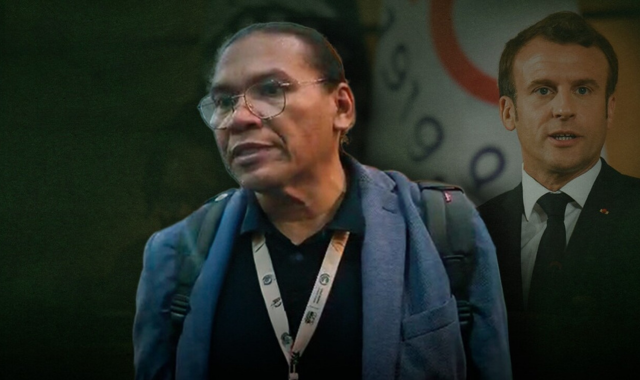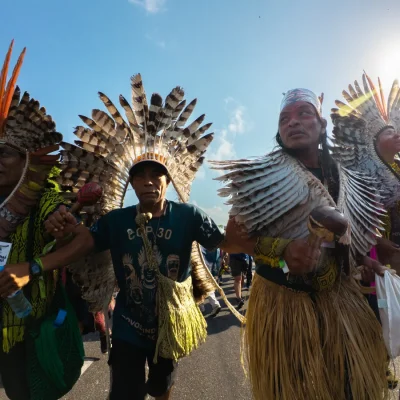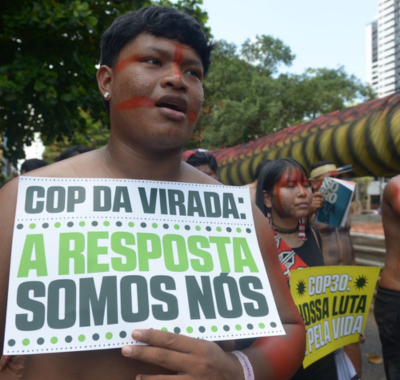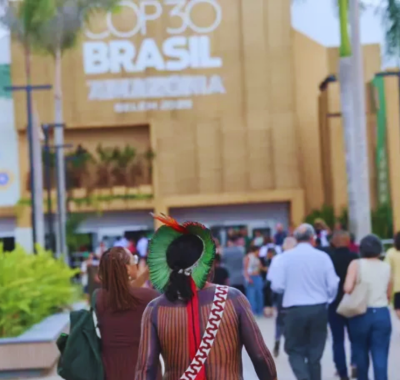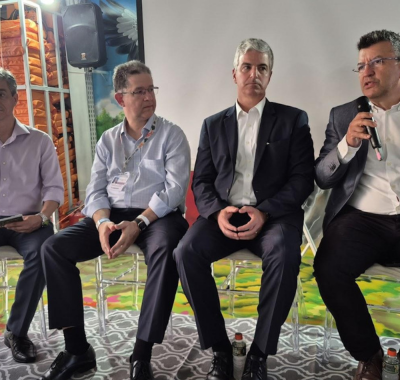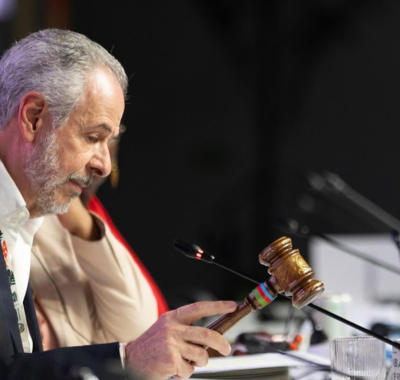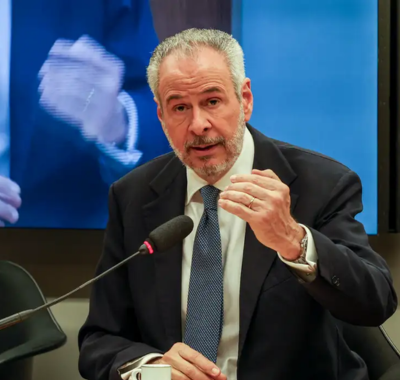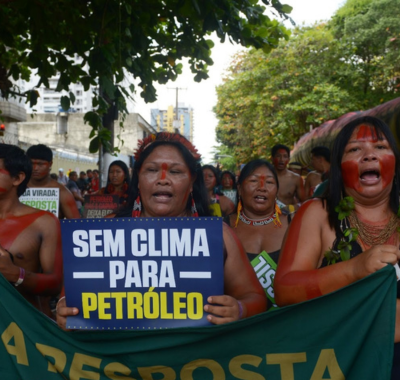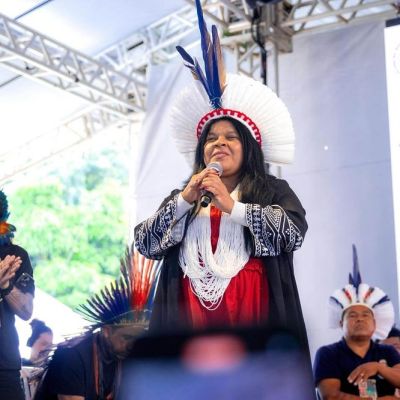Auhor: Ana Cláudia Leocádio
Jean-Paul Ferreira, the first vice-president of the Territorial Collectivity of Guiana (CTG) – the local government of the territory – celebrated the beginning of a new cooperation between Amazonian territories. Meanwhile, he criticized the fact that France’s Constitution still does not recognize Indigenous Peoples, leaving them uncovered by national public policies. Ferreira also criticized President Emmanuel Macron, who has spoken abroad in defense of Indigenous Peoples, but whose stance, according to him, is not reflected in the treatment given to these communities within French territory.
The statement was made during an afternoon meeting with Amapá state governor Clécio Luís (Solidariedade Party) in the corridors of the Blue Zone of the 30th UN Climate Change Conference (COP30), in Belém, this Monday October 10th. They met before the opening of the Amazon Hub at the pavilion of the Interstate Consortium of the Legal Amazon.
French Guiana is an overseas territory of France, bordering Brazil to the South and East, and Suriname to the West, with Cayenne as its capital. Approximately 95% of its total area is covered by Amazon rainforest, and its population combines European cultural elements with Afro-Caribbean and indigenous influences. Since April 2015, French Guiana ceased to be a French overseas department and became the Territorial Collectivity of Guiana (CTG). Although it remains as French territory, it gained greater administrative autonomy.
In addition to discussing the importance of regional cooperation, Ferreira described the difficulties faced by Indigenous Peoples in French Guiana. For this reason, he sought to establish new partnership agreements with the state of Amapá, focused on bioeconomy and logistical development.
“It’s very complicated in Guiana because the French State does not recognize the indigenous populations in its Constitution. So, people in France are very, very different from Brazil, and that is not sufficiently taken into account by different public policies in Guiana and France,” he criticized.
In March 2024, Macron visited Belém, where he met with President Luiz Inácio Lula da Silva and Indigenous Chief Raoni at a COP30-related event. On that occasion, the French President and Lula signed the Brazil-France Call for Climate Ambition from Paris to Belém and Beyond, aimed to support the climate agenda and the preservation of the Amazon, as well as promote Indigenous Peoples. Macron recognized the importance of the Amazon and promised support to and investments in the region’s bioeconomy.
In Ferreira’s opinion, the French president maintains an international discourse defending Indigenous Peoples, but that does not materialize within French territory – a contradiction that, according to him, has historically led Guianans to demand constitutional recognition of native peoples by the French State. In addition to Guiana’s indigenous communities, another French overseas territory is New Caledonia, in the South Pacific, where the Kanaks live. France, however, adopts a unitary nation-state model, which historically avoids recognizing specific ethnic communities or minorities, prioritizing the formal equality of all citizens before the law.
“The Macron government – President Macron – has effectively made an international statement about indigenous populations, whether in the Amazon or in other territories, but he will not say the same in his own French territory. That is the problem for the indigenous populations. A total contradiction between what he shows internationally and what he does at the domestic level,” said Ferreira, who is an indigenous person himself and presides over the Guiana Regional Natural Park.
Upon meeting with Governor Clécio Luís at COP30, the territorial leader of French Guiana, whose position is analogous to that of vice-governor, stressed the importance of the event held in Belém. “What we must especially remember is that COP30, which is taking place today in Belém, is not an end in itself but rather the beginning of something: the strengthening of the relationship between the different territories,” he said.
Cooperation with Amapá
Governor Clécio Luís stressed that Amapá, Amazonas, Pará, and French Guiana share the same Amazon, with its wealth and challenges. Therefore, the cooperation agreement with CTG is an essential tool to face them together. The Guianan delegation at COP30 includes over 100 people in the capital of Pará.
“This COP is different: it is being discussed and debated by Amazonians, which makes all the difference for the Amazon itself, for those who live in it, and also for the world. Until now, in 29 COPs, everyone talked about the Amazon without knowing the Brazilian Amazon, the French Guianan Amazon, the Surinamese Amazon, and so on. For the first time we are discussing with global authorities and heads of state, with the significant participation of Amazonians of various nationalities, and this will make all the difference,” said Clécio Luís, praising the size of the Guianan delegation.
For Ferreira, the relations between French Guiana and Amapá are historical and should be strengthened over time, especially given the prospect of oil exploration in the Equatorial Margin. The cooperation agreement involves several areas.
“It’s about bioeconomy, about logistics, because Macapá will experience an extraordinary economic boom with oil exploration. This should obviously benefit the state of Amapá, but also its neighbor, Guyana,” Ferreira added.
This report was produced by Revista Cenarium, through the Collaborative Socio-environmental Coverage of COP 30. Read the original report here.

